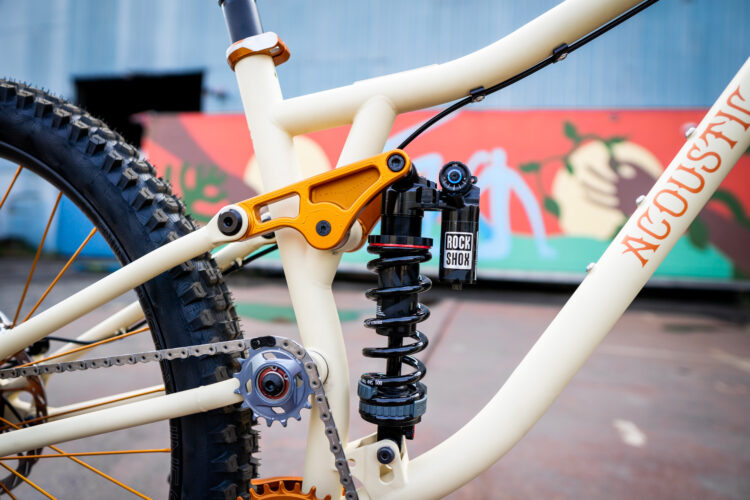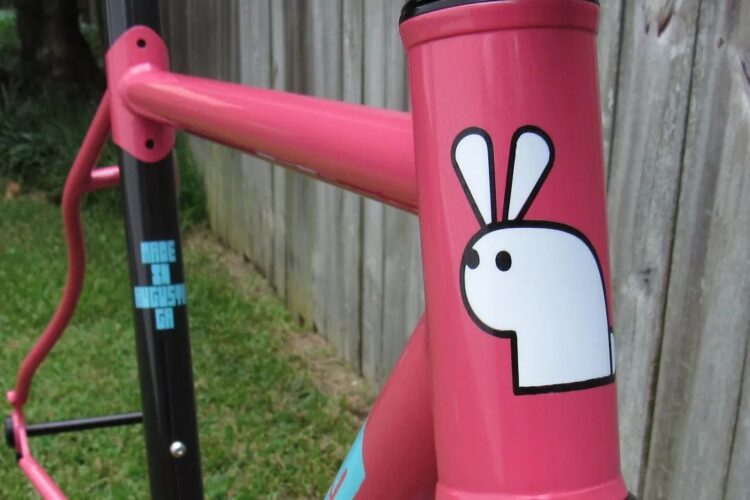
Adam Sklar is the founder of Sklar Bikes. Like many boutique bike builders, Sklar handcrafts unique frames, making riders stand out at the trailhead.
His newest bike, the Super Something, and the Tall Tale, which he hopes will be released in the Spring of 2024, are no exception. The only difference? Sklar’s hands didn’t build these frames.
If you are familiar with custom, handcrafted bikes, you likely know about long waitlists and high prices, to which Sklar is no stranger. With growing popularity making the waitlist even longer, Sklar began to question the sustainability of the model, along with the accessibility of his bikes.

Sklar Bikes from the start
Sklar grew up in Boulder, Colorado, skiing, camping, and generally doing outdoor “Colorado” things. Bikes weren’t a massive part of Sklar’s childhood until high school.
“My ski friends got into mountain bike racing and convinced me to go mountain biking. It took super hard, and I got really into bikes,” Sklar said.
In 2011, Sklar headed to college, and pursued mechanical engineering in Bozeman, Montana, where he built his first frame. He bought tubing from Home Depot and began crafting. His first frames weren’t great.
“I took it to a frame builder I knew in Boulder. His reaction was, ‘Wow, this sucks,’” Sklar said of his first frame. “So he gave me a little brazing lesson and taught me just enough to mess around a bit more seriously.” And so began Sklar’s passion for frame building.
Bikes weren’t Sklar’s occupational plan. He worked at an engineering firm doing consumer product design during and after college. Sklar built that first frame during his first semester at college and only a handful more during his university stay. Building bike frames was initially just for fun.
However, “fun” was becoming a growing business. It was 2016, and Sklar was now out of college, working full-time at the engineering firm but also fielding calls from people interested in his bikes. His boss at the engineering firm, a cyclist as well, also noticed Sklar’s side hustle picking up.
“I got back from a trip on the Colorado Trail, and my boss wanted to grab coffee,” Sklar said. After some encouragement from his boss to choose a direction, Sklar went all in, building bikes. “I’ve been self-employed since.”
And when things kicked off, they really kicked off. In 2017, Sklar was awarded Best Mountain Bike at the North American Handmade Bicycle Show (NAHBS). Sklar’s unique take on a fully rigid steel singlespeed won him the award.
Building a Company by hand-building Bikes
If boutique bikes are a sub-genre of mountain biking, handmade mountain bikes are a sub-genre of a sub-genre. Yet, this tiny world has a larger reach than one might assume.
Sklar Bike’s primary marketing strategy early on was word-of-mouth referrals. And although this kept him busy, social media also played an early and important role. Instagram pictures drove customers to his website in the beginning.
“Instagram was a different place back then. I was really in the right place at the right time,” Sklar said. “I feel like there are a couple of weird communities on there that have done well, and handmade bikes are one of them.”
Customers also found Sklar at bike races and events. “‘Cool bike’ is usually how it starts. Then they find out I build them,” Sklar said. “Soon, they are getting in contact.”
Sklar Bikes outgrew several garages and machine shop corners until they finally found their own rental space in Bozeman. Sklar remains at this location today, now fulfilling production frames from the location.


A bike brand now too big for one man
Sklar’s decision to pursue custom frame building paid off. He became known in the handmade frame builder circle and steadily grew customers.
When he won Best Mountain Bike at NAHBS in 2017, growing a customer base turned into a maintaining lengthy waitlist. “It became a two-year waitlist in 2018 and stayed that way until I stopped taking orders in 2021,” Sklar said.
Sklar finally crossed the last name off his waitlist in the Spring of 2023. Time and prices are the tradeoff for truly unique bikes. “I’d spend two months designing them with the customer. They’re all completely different from the ground up,” Sklar said.
But the process wore on Sklar.
“Personally, I’d never wait two years for a bike. So there was some dissonance there,” he shared. He wanted customers on his bikes faster. He wanted his product to be the bike, not the bike-design experience.
“I wanted the experience to be riding the bike; the bike to be the product,” Sklar said. “I found it very frustrating that people had to wait that long.”
Price was also a factor. Custom bikes from Sklar regularly jumped above $10,000. He knew this meant many mountain bikers, including friends, couldn’t afford one of his bikes.
Sklar experimented with non-custom frames in 2019 to offset an ever-growing waitlist. He offered a hardtail mountain bike, the Sweet Spot, in five sizes. “That was my first step into seeing if people wanted a non-custom bike from me, “ Sklar said.
Taking these factors into consideration, Sklar has transitioned to bike production overseas. He tested it in 2022 with a new gravel bike, the Super Something, and decided to keep production overseas into the future. Sklar hopes to release a new mountain bike, the Tall Tale, in the Spring of 2024.


Controlling quality in another country
With production literally out of his hands, one might assume that Sklar is concerned with the quality of frames from overseas factories. However, Sklar insists his namesake will remain at a top-quality level.
“The quality is really good. They make some of the best bikes in the world,” Sklar said of his new factory. “The people welding in the factories weld more bikes in a week than have in my life.”
Sklar explained the “risk” of having his bikes produced overseas and that it doesn’t mean a lesser quality.
“The only risk is that you get exactly what you ask for…designing the first bike took about a year.” Sklar checked every box and double-checked every little detail. Quality isn’t the issue; having your ducks in a row is.
Sklar is also thankful for his engineering background when he works with partners overseas. He knows the language.
“It’s nice to be able to push back on some of the things the factory says,” he said. “I know otherwise because of my engineering background and building hundreds of bikes.” His understanding and education keep him highly involved despite the building happening a world away.
Does Sklar feel less of a craftsman? Has he lost touch with his art? Sklar doesn’t think so. “When I bend my seat stays, it changes over time. Eventually, I know exactly how to do them every time. All the things in the production frames are what I’ve arrived on building hundreds of frames,” Sklar said. “Even though my hands weren’t on them, they wouldn’t exist without me. Where do you want to draw the line?”
Sklar worried about his customers being upset after hearing production was moving overseas, but it hasn’t come.
“I was bracing for some negative feedback,” Sklar said, “but I haven’t really gotten any. But there’s no world where I continue to do the custom stuff. I don’t believe in it. Now, I’m making bikes for my friends…this feels more like me than ever before.”





















1 Comments
Nov 7, 2023
With the current state of the Onion, peeps might be tightening the purse strings and really not wanting a car loan for a bicycle.
Well, I am sitting on ~400k in medical bills from cancer treatment... So I for one cannot relate to prices we are witnessing. SpecialEd is one of the production companies that went into the stratosphere with some models. I suppose there are folks lining up to pay the price and be upside down.